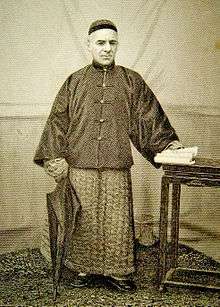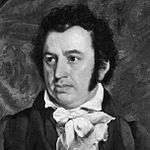William Chalmers Burns
| William Chalmers Burns | |
|---|---|
 Missionary to China | |
| Born |
1815 Dun, Forfarshire, Scotland |
| Died |
1868 Niú Zhuāng, China |
William Chalmers Burns (宾惠廉, 1 April 1815 – 4 April 1868) was a Scottish Evangelist and Missionary to China with the English Presbyterian Mission who originated from Kilsyth, North Lanarkshire. He was the coordinator of the Overseas missions for the English Presbyterian church. He became a well known evangelist through his participation in two periodic Anglo-American religious revivals.
Biography
Burns was brought up in a well-to-do household. The third son of a local church minister, William Hamilton Burns (1779–1859) and Elizabeth Chalmers (1784–1879). At the age of seventeen, Burns' faith was strengthened through tragedy, and he subsequently commenced theological training at Marischal College in Aberdeen, and at the University of Glasgow's Divinity Hall. (His brother Islay, author of Memoirs, was later a professor there).
During a revival meeting, he encountered an experience in which it became apparent that God had particularly appointed him into His service. By 1839, at the age of 24, Burns had obtained the license to preach from the Glasgow Presbytery.
While still in his homeland of Scotland, he experienced, together with the preacher Robert Murray M'Cheyne, genuine revival meetings. It was one of the tools from which the great spiritual revivals in his home town of Kilsyth resulted, that took place from 1839-07-23. Burns preached at St. Peter's in Dundee while Robert Murray M'Cheyne was away on a mission to the Jews in Palestine. The days of revival also deeply affected Dundee, and continued after M'Cheyne returned to St. Peter's in November, 1839.
In 1843, Burns sided with Thomas Chalmers in the disruption within the Church of Scotland. In 1845, he visited Canada with his uncle, Rev. Dr. Robert Burns, minister from Paisley, and the younger Burns preached for the Free Church cause in many communities, including Montreal, Canada East, and in Glengarry County, where he preached in English, Gaelic and French. He later travelled into Canada West, although there was interest in his ministry in France. His uncle remained in Canada, becoming minister of Knox Church, Toronto and later (1856–1869) a Professor at Knox College, University of Toronto.
In 1847, Burns went to the Chinese empire via Hong Kong.[1] During this long ship journey, he spent a lot of time studying the Chinese language. He began his missionary service during the late Qing Dynasty in British Hong Kong and went on to preach in such locations as Shantou, Xiamen and Beijing.
In 1855 Burns met Hudson Taylor and the two worked together for quite some time. Both had the courage to advance into the Chinese interior. Hudson Taylor regarded Burns as one of his spiritual mentors and wrote about the depth of Burns' prayer life. Taylor, however, influenced Burns in the way in which he sought to contextualize his ministry by breaking with missionary tradition to wear Chinese clothing while evangelizing in China's interior. During his twenty years of preaching the gospel in China, Burns also spent a short period wrongly imprisoned at Guangzhou.
In 1868, Burns died after a short illness in Yingkou (Newchwang), (Liaoning Province).
One of William Burns' well known quotes was: "Always be ready" (1 Peter 3:15).
References
- ↑ The Chinese recorder and missionary journal, Volume 30. VOLUME XXX. Shanghai: American Presbyterian Mission Press. 1899. p. 371. Retrieved March 21, 2012.
20th century, which will begin its course in eighteen months from the present time. There is no sign of abatement in missionary enthusiasm. It will increase greatly during the next century, and the prospect is favourable in a very high degree. The victory which we anticipate for Christianity is the victory of the Word of God. Let me just refer to the results of Bible circulation during the last year. The British and Foreign Agency sold 728,000 portions of the Scriptures, and among these 32,000 New Testaments. The portions were a gain of twenty per cent over the numbers iu 1897 and the New Testaments were nearly two-thirds more than in that year. Whole Bibles and Old Testaments were one-fifth more than in the previous year. If we compare the circulation of the Scriptures now with what it was ten years ago it is fully five times as great. What cau the conservative party do when they are struggling to resist the progress of the Word of God? Let us break their bauds asunder, they say. Let us cast away their cords from ns. Bnt the Lord will have them in derision. He will break them in pieces as a potter's vessel. The American Bible Society also aided to a very gratifying extent the amount of Bible circulation. They number 437,000 Scriptures and portions sold during the past year. In all 1,165,000 is the amount of circulation for 1898, and a million for 1897. The Chinese have spent about §25,000 in buying the Scriptures and §22,500 iu buying the books of the Diffusion Society and of the Chinese Tract Society. The Mission Press, Shanghai, printed fortyfive million pages during last year. The missionary Conferences of the past year have been productive of much increase in spiritual devotedness on the part of those who have taken part in them. The visit of Mr. Iuwood, the representative from Keswick, was very much enjoyed. A great susceptibility was shown by the Chinese, especially in southern cities. The impression on Mr. Inwood's mind was very favourable. He saw signs of the presence of the Spirit of God attending the ministration of the Word of God. His words, translated for him into the local dialect, found their way to the hearts of the people. They felt the presence of the power of God. The revival spirit followed him to each new mission station, and the native Christians, with their pastors and the missionaries who superintend their churches they have founded, rejoiced in the time of refreshing from the presence of the Lord, which came to them as to others like a gracious rain of influence from above Such things make this year memorable in the history of the Missions. It reminds me of the visit of William Burns for a few years in China. He was in heart and in zeal a revivalist. He had taken part in powerful revivals in Scotland and in Ireland. He came to China in 1847, and a few years later he
Original from Harvard University Digitized Aug 20, 2007
- McMullen, Michael D., God's Polished Arrow: W. C. Burns, Revival Preacher, Christian Focus Publications, 2000, ISBN 1-85792-395-2
- Burns, William C., Revival Sermons, Banner of Truth Trust, 1980, ISBN 0-85151-316-6
- Stewart James Alexander, Biographical Sketches: William Chalmers Burns / Robert Murray McCheyne, Asheville, NC: Revival Literature, 1963
- Tow, Timothy, William C Burns: Grandfather of Bible-Presbyterians, Singapore: Christian Life Publishers, 1994. ISBN 9971-9913-4-9
- Burns, Islay, Memoir of the Rev. Wm. C. Burns, M.A : missionary to China from the English Presbyterian Church, 1870. (Reprint: San Francisco : Chinese Materials Center, 1975)
- Clarke, Agnes H. L., China's man of the Book. The story of William Chalmers Burns, 1815–1868, London : Overseas Missionary Fellowship, 1968
- Houghton, S. M., Five pioneer missionaries: D. Brainerd, W. C. Burns, J. Eliot, H. Martyn, J. G. Paton, London : Banner of Truth Trust, 1965
- MacMillan, Donald N., The Kirk in Glengarry-A History of the Presbytery of Glengarry (Presbyterian Church in Canada) 1787–1984, 1985.
Dutch
- Valen, L. J. van, Die aan alle wateren zaait : uit het leven van William Chalmers Burns ; zendeling en evangelist, Ede : Hardeman, 1988, ISBN 90-71272-22-2
External links
- This article was originally a direct translation from de:William Chalmers Burns and partly from zh:賓惠廉
